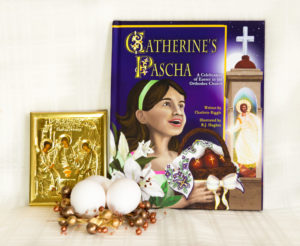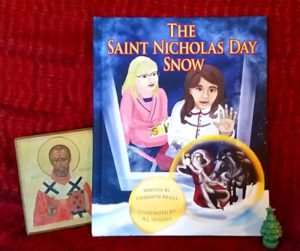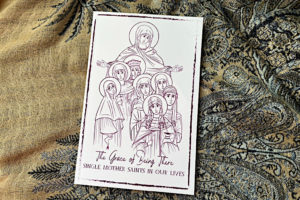When you became a godparent, you assumed responsibility before God to bring the child up in the Orthodox faith. You pray for your godchildren, of course. You light candles for them every time you enter a church. But if you mean to ensure that your godchild loves the Church as much as you do, you need to think like a child.
Routines and traditions
Children want and need routines. Routines give children a sense of security. The daily rhythm of life, of the same things done in the same way, every day, helps make the world predictable, and therefore safe. Weekly variations in the rhythm help build the child’s understanding of time, and of a larger world.
Traditions can be thought of as routines with a longer rhythm. If you pop popcorn and watch a movie every Friday night, that’s a weekly routine. The things we do to mark birthdays, or the beginning of a school year, are traditions. Traditions help young children feel grounded. Traditions give a child a sense of connection, of belonging. They make a child feel loved.
To grow up in the faith, children need to feel grounded in it. They need to know that they belong in the Church. They need to feel loved.
The Church year gives you many, many opportunities to build routines and traditions with your godchild. Each of the routines and traditions you build helps anchor your godchild more solidly in the faith. They strengthen your relationship with your godchild. And through that relationship, they give your child a stronger connection to the Church. If, as they get older, they leave the Church for a while, these traditions will exert a pull.
If you always made sugar cookies or kourambiethes or pryaniki for your godchild at Christmas, when Christmas comes, that memory will create a desire for those holiday treats, and for the love and affection that the child associates with them. And your cookies will keep your godchild’s heart open to the Church.
Christmas traditions are good, of course. But Pascha! The Feast of Feasts, the Holy Day of Holy Days! It’s a greater day by far than Christmas. And there are so very many ways that you can build traditions with your godchildren, to help them fall in love with the Feast. Everyone will be so busy, by the time Pascha arrives. You’ll want to start planning now.
Time to prepare
Think about the things you do to prepare for Pascha. Prayer and fasting and almsgiving, of course. But perhaps you also make palm crosses on the afternoon of Lazarus Saturday for the Palm Sunday liturgy. Perhaps you dye red eggs on Holy Friday. Maybe you attend liturgy on Holy Saturday in the morning, then spend the rest of the day decorating the church, or making lamb soup.
Talk to your godchild’s parents about having your godchild join you for one of these activities. Pick one that you think your godchild will especially enjoy. Make sure it’s one that you won’t feel frustrated if having a child along slows you down.
And plan on inviting your godchild to join you for this activity every year. The more times you do it, the more meaning it will have for your godchild. The more times you do it, the more warmth and affection your godchild will feel for you, and for the Church.
Services
If your godchild’s parents are not able or willing to take your godchild to Paschal services, it is your responsibility to do so. Be sure to talk with the parents well in advance, and work out which services you can take your godchild to. There are plenty of services to choose from!
If you take your godchild to the midnight service, talk to the child, and their parents, about the plans for after the service is over. Will the child spend the rest of the night with you? Will you return your godchild home at 4 in the morning? Make sure everyone (especially your godchild!) understands the plan.
Special foods
Of course you make special foods for Pascha. Consider the power in making something special just for your godchild. The memories of holiday foods, the tastes and smells can evoke powerful feelings of love and belonging many years later.
Have your godchild join one day during Bright Week for an afternoon spent making Paschal treats. Make honey bunnies, or koulourakia. If you don’t think you can bake, you can make something easy and fun like Peeps in marshmallow nests. And, again, plan to make baking day a Paschal tradition. It’s just what you do on Bright Tuesday. When your godchild is grown, Bright Tuesday will be another anchor connecting them to your love, and through you, to the Church.
If your godchild lives far away from you, you can’t bake together, of course. But you can still make homemade treats and mail them to your godchild. Make and send the same treats every year. If you decide that your godchild is too old for Peeps in marshmallow nests, then of course you could send a more sophisticated goodie. But don’t be surprised if, after having shared them with you for many years, your 26-year-old godchild still wants just one or two Peeps in marshmallow nests at Pascha.
Gifts
Children know that, in our culture, important days are celebrated with gift-giving. You may want to give your godchild a gift for Pascha.
Again, consider how you can make your Paschal gift-giving into a deeply felt tradition. A gift certificate might be convenient to give, but it doesn’t provide much in the way of attachment. Instead, think of a kind of thing that you can give every year. It might be a book, or a game you can play with them, or a framed photograph of you and them together.
Each year, the gift will be the same, but different. The pattern will stay consistent, even as the specifics grow and change. As with the other traditions that you create with your godchild, the pattern will build the sense of comfort and attachment that helps children know they belong. The traditions will remind your godchild that they are part of something larger than themselves. The warm memories and affection will keep your godchild connected to you, and through you, to the Church.
This post first appeared on MyOCN.net.
Read More
“Let ALL the children come,” including those who need gluten-free food: Victoria Marckx, church school director at St. Demetrios Orthodox Church, Winnipeg, Manitoba, explains how her parish makes it possible for people with severe food allergies to share in pot lucks and parties.
Recipes on Charlotte’s blog: If you’re looking for traditional or not-so-traditional treats for Pascha, you’ll find recipes here.
6 exceptional multicultural Easter picture books: These six lovely books show the ways that people in other countries and cultures celebrate Easter.
Books by Charlotte Riggle

This holiday classic shares the joy of Pascha through the eyes of a child. Find it on Amazon or Bookshop.org.
![]()

This delightful story is filled with friendship, prayer, sibling squabbles, a godparent’s story of St. Nicholas, and snow. Lots and lots of snow. Find it on Amazon or Bookshop.org.
![]()

In this collection of essays, women who are, or have been, single mothers share stories of their relationships with saints who were also single mothers. Charlotte’s story of the widow of Zarephath highlights the virtue of philoxenia. Find it on Amazon or Park End Books.





THANK YOU and God bless you, Charlotte! This is a gift!! You have put so many wonderful ideas in one place…I will be sharing widely!
Thank you for your kind words, Leslee. I’m grateful!